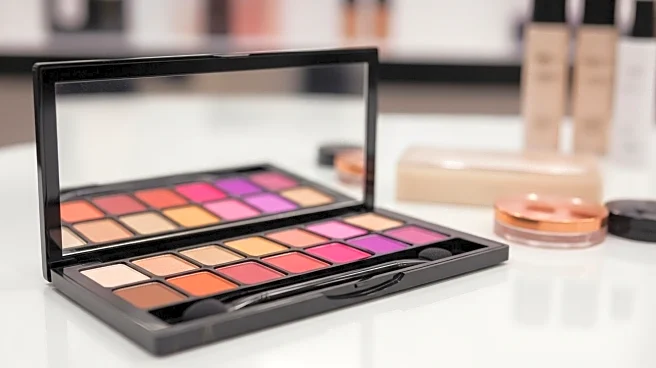What's Happening?
Ulta Beauty has reported a significant increase in quarterly net sales, defying initial projections for 2025. The beauty retailer experienced a 9.3 percent rise in sales, prompting an upward revision of its full-year growth forecast to between 2.5 and 3.5 percent. This growth comes despite a general slowdown in the beauty industry, with major players like Estée Lauder Companies and L’Oréal experiencing weakened consumer sentiment in the U.S. market. Under the leadership of CEO Kecia Steelman, Ulta Beauty has implemented the 'Ulta Beauty Unleashed' turnaround plan, focusing on merchandising and digital strategies. The company has introduced 24 new brands, including exclusives like Beyoncé’s hair care line Cécred and Shakira’s Isima, which have contributed to its competitive edge against rivals like Sephora.
Why It's Important?
Ulta Beauty's unexpected sales growth is significant as it highlights the company's ability to navigate industry challenges and consumer sentiment shifts. By expanding its brand roster and enhancing in-store experiences, Ulta Beauty is effectively differentiating itself from competitors, particularly Sephora. The retailer's loyalty program, which grew by 4 percent, reaching 45.8 million members, underscores its strong consumer engagement. This development is crucial for stakeholders as it suggests potential resilience in the beauty sector despite broader economic uncertainties. Ulta Beauty's strategic moves, including international expansion and the launch of an online marketplace, could further bolster its market position and offer new growth avenues.
What's Next?
Ulta Beauty plans to continue its transformation by focusing on its own stores and exploring new sales channels. The company is set to unveil its Amazon-competitor marketplace in the third quarter, aiming to capture a larger share of the beauty market. Additionally, Ulta Beauty is expanding internationally through acquisitions and partnerships in the UK, Middle East, and Mexico. Observers will be watching the performance of newly launched brands and the impact of tariffs expected to affect the beauty industry later this year. Despite uncertainties, Ulta Beauty remains optimistic about consumer engagement in beauty regimens.
Beyond the Headlines
Ulta Beauty's strategic decisions reflect broader trends in the retail industry, where companies are increasingly focusing on exclusive partnerships and experiential marketing to drive growth. The cancellation of its partnership with Target indicates a shift towards prioritizing direct consumer engagement and store experiences. This move could influence other retailers to reassess similar partnerships and focus on strengthening their core operations. The company's international expansion and marketplace launch also highlight the growing importance of global markets and digital platforms in retail strategies.










